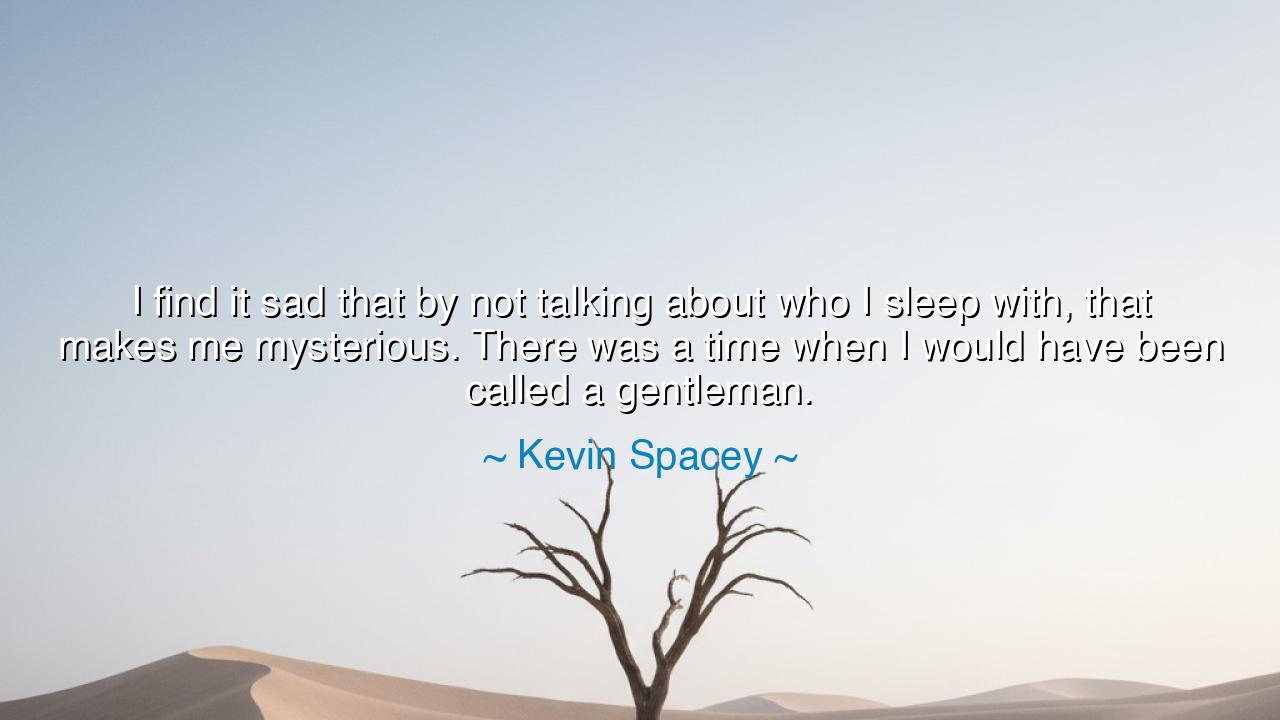
I find it sad that by not talking about who I sleep with, that
I find it sad that by not talking about who I sleep with, that makes me mysterious. There was a time when I would have been called a gentleman.






When Kevin Spacey said, “I find it sad that by not talking about who I sleep with, that makes me mysterious. There was a time when I would have been called a gentleman,” he was reflecting on the shifting moral landscape of the modern age—an age where privacy, once a sign of dignity, is now mistaken for secrecy. His words carry the weight of lamentation, a sorrow for a culture that has begun to equate silence with guilt, and discretion with deceit. Beneath his statement lies an ancient truth: that once, restraint was the mark of virtue, and modesty the crown of self-respect.
In times past, to be called a gentleman was not simply to be well-dressed or well-mannered—it was to possess a code of inner conduct, a reverence for the sacred boundaries between the self and the public. The gentleman did not boast of conquest, nor seek validation through the eyes of the crowd. He guarded the privacy of others as he did his own. But in an age intoxicated by revelation, where confession has become currency, and where the public feeds upon the intimate lives of the famous, the man who remains silent becomes a riddle, and the woman who guards her heart becomes an enigma. Spacey’s sadness is not for himself alone—it is for a world that has forgotten how to honor mystery.
The origin of this sentiment lies in the ancient virtues of modesty and restraint, which were once celebrated in all great civilizations. In ancient Rome, Cato the Younger was admired for his temperance; he refused luxury and gossip, living as a model of self-discipline. The philosopher Epictetus taught that true freedom comes not from indulging every desire, but from mastering them. And the knights of the medieval world—though far from perfect—upheld the ideal that the measure of a man was found in his integrity, not in his boasts. To keep one’s private life private was not evasion; it was dignity. It was, as Spacey said, gentlemanly.
His observation also reveals a deeper paradox of the modern spirit. The world now demands transparency, not as an act of honesty, but as a form of entertainment. The more one reveals, the more one is praised for “authenticity.” Yet the ancient masters of the soul warned that too much exposure weakens the spirit, just as too much sun burns the skin. The poet Rainer Maria Rilke once said, “Everything is gestation and then bringing forth.” What he meant was that the sacred—love, art, faith—needs darkness to grow. When the private is constantly dragged into the public, what remains sacred dies. Thus, Spacey’s lament becomes a warning: that when society demands confession as proof of truth, it destroys the very concept of inner life.
And yet, there is a tenderness in his grief. To call himself “a gentleman” is to recall a time when virtue was quiet, when character was revealed not through words but through conduct. His tone is not arrogant, but nostalgic—like a man remembering a civilization that once valued silence as strength. The sadness he names is the sadness of all who live between worlds: those who remember what was noble before it became unfashionable. In his voice, one can almost hear the echo of the ancients sighing over the loss of their own ideals.
The meaning of his words, then, is not limited to questions of fame or sexuality—it is a reflection on the erosion of grace. To be mysterious once meant to possess depth, to carry one’s truths like treasures, not like weapons to be brandished. To be silent was once to be wise. But in a time when the world shouts for revelation, the quiet man becomes suspicious, and the modest woman, strange. In such a world, privacy becomes rebellion, and dignity becomes defiance.
Let this, then, be the lesson for those who live in the noise of the present age: guard your mystery. Do not measure your worth by what you disclose, nor by how loudly the world demands it. Choose discretion over display, and let your actions speak more powerfully than your words. For the ancients knew what the modern heart has forgotten—that silence can be honorable, restraint can be strong, and a true gentleman, or gentle soul, need not shout his virtue to be known. In the end, the greatest dignity is not to be understood by all, but to remain true to oneself, even when the world calls that mystery.






AAdministratorAdministrator
Welcome, honored guests. Please leave a comment, we will respond soon